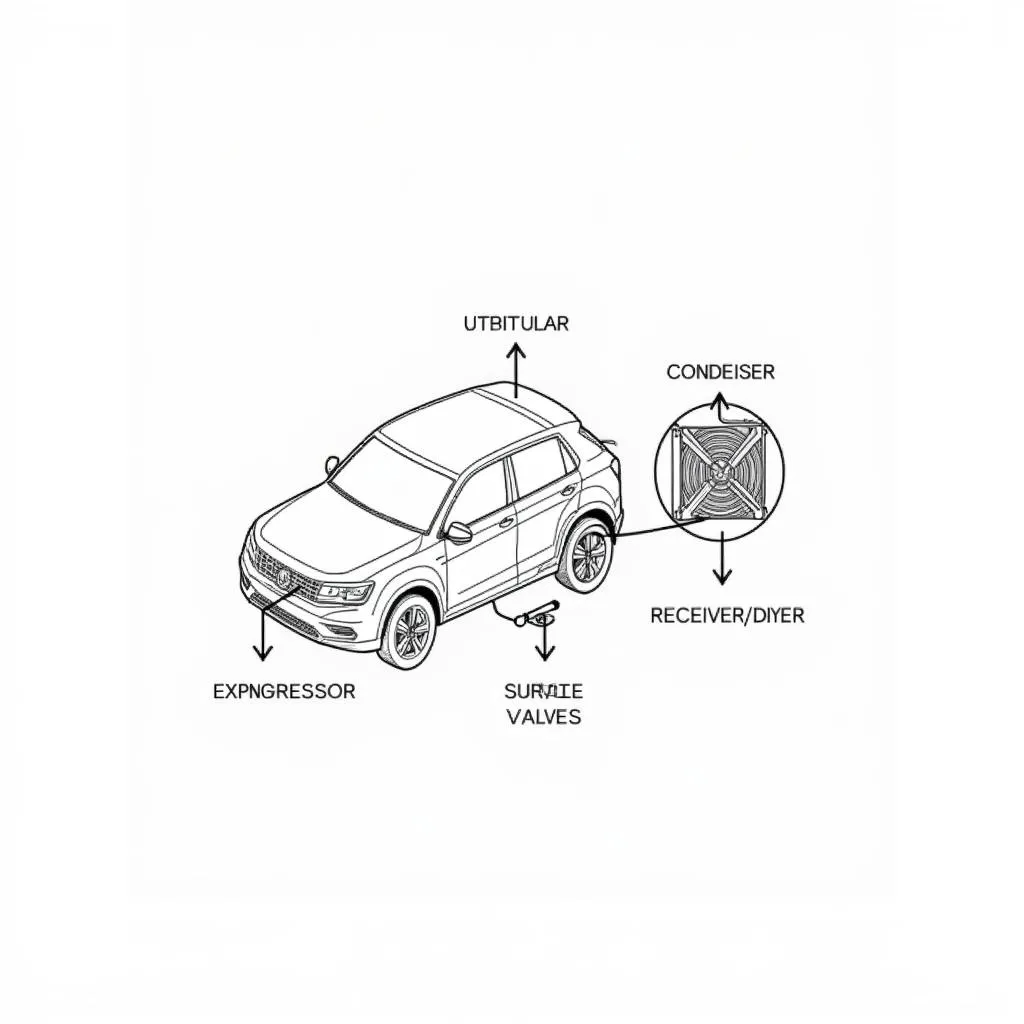Your car’s air conditioning system is essential for a comfortable driving experience, especially during the hot summer months. When your AC isn’t working correctly, it can make driving unbearable. Understanding the basics of air conditioning for cars repair can save you from discomfort and costly repairs.
Common Car AC Problems and Troubleshooting Tips
Several issues can arise with your car’s AC system. Here are some common problems and how you can troubleshoot them:
- Blowing hot air: This is often a sign that your AC system has lost refrigerant. A leak in the system can lead to refrigerant loss.
- Weak airflow: A clogged cabin air filter can restrict airflow to your AC vents. Replacing the filter is a simple DIY task.
- Strange noises: Unusual sounds like hissing, grinding, or clicking could indicate a problem with the AC compressor or other components.
- Foul odors: Musty smells coming from the vents usually mean mold or bacteria growth in the evaporator case.
If you’re experiencing any of these issues, it’s best to consult a qualified mechanic specializing in air conditioning for cars repair.
Understanding Your Car’s AC System
To better grasp common AC issues, it’s helpful to understand the basic components of your car’s AC system:
- Compressor: This component compresses and circulates refrigerant through the system.
- Condenser: Located in front of the radiator, the condenser converts hot refrigerant gas into a liquid.
- Evaporator: Positioned inside the dashboard, the evaporator absorbs heat from the cabin air, cooling it down.
- Receiver/Drier: This unit stores refrigerant and removes moisture from the system.
- Expansion Valve: This valve controls the flow of refrigerant into the evaporator.
The Importance of Regular Car AC Maintenance
Just like any other system in your car, regular maintenance is key to keeping your AC running smoothly. Here are some maintenance tasks that can prevent costly repairs:
- Regular Inspections: Have your AC system inspected by a qualified technician at least once a year, preferably in the spring before the hot weather hits.
- Refrigerant Recharge: Over time, your AC system can lose refrigerant, leading to reduced cooling performance. A refrigerant recharge can restore your AC’s efficiency.
- Cabin Air Filter Replacement: Replacing your cabin air filter every 12,000 miles or as recommended in your owner’s manual can improve airflow and prevent foul odors.
Choosing the Right AC Repair Shop
Finding a trustworthy and experienced mechanic for air conditioning for cars repair is crucial. Look for shops specializing in AC repair and ask for recommendations from friends or family.
[Quote from John Smith, Senior Automotive Technician at XYZ Auto Repair]
“Choosing a specialist for your car AC needs is essential. Look for technicians certified by organizations like the National Institute for Automotive Service Excellence (ASE).”
Cost of Car AC Repair
The cost of air conditioning for cars repair can vary widely depending on the issue, the make and model of your vehicle, and your location. Here’s a general idea of what you might expect:
- Refrigerant Recharge: $100 – $250
- Condenser Replacement: $300 – $800
- Compressor Replacement: $500 – $1500
Keeping Your Cool On the Road
A well-functioning AC system is essential for a comfortable and enjoyable driving experience. By understanding the basics of air conditioning for cars repair, practicing preventative maintenance, and seeking professional help when needed, you can keep your cool behind the wheel all summer long.
FAQs
1. How often should I recharge my car’s AC?
It’s generally recommended to have your car’s AC system inspected for refrigerant leaks and recharged every 2-3 years.
2. Can I add refrigerant to my car’s AC myself?
While DIY refrigerant recharge kits are available, it’s best left to professionals. Handling refrigerant improperly can be dangerous and harmful to the environment.
3. Why does my car AC smell bad when I turn it on?
A musty smell usually indicates mold or bacteria growth in the evaporator case. This can be addressed with an evaporator cleaning service.
4. How can I tell if my car AC compressor is bad?
Signs of a failing compressor include loud noises when the AC is on, inconsistent cooling, and a burning smell.
5. Can a clogged cabin air filter affect my AC?
Yes, a clogged cabin air filter restricts airflow, leading to weak AC performance.
Need help with your car’s AC?
Contact us today via WhatsApp: +1(641)206-8880, or email us at [email protected]. Our team of experts is available 24/7 to answer your questions and assist with all your air conditioning for cars repair needs.



